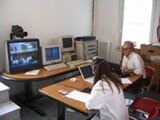Telemedicine supports a project of cooperation between Italy and Iraq
More than 120 registrants participated in a recent conference to discuss the success of the Simona Project, an initiative sponsored by the Italian humanitarian aid organization INTERSOS and supported by the European Space Agency.
"The conference saw a high level of interaction among the spokesmen and people attending,” said Alessandro Guarino from INTERSOS. A delegation of medical professionals from hospitals in the north, the centre and the south of Iraq were also in attendance.
"The project Simona proves that Telemedicine, when integrated in a professional environment with people motivated and willing to learn from each other, can become a key instrument to support clinical collaboration and finally improve the quality of life of patients," says Francesco Feliciani, coordinator of Telemedicine activities in ESA Telecom.
"We are really pleased to acknowledge that examples like Simona are producing impacts that can be measured in terms of clinical outcomes, which means much more than demonstrating that Telemedicine is technically feasible."
Feliciani notes this is achieved as a result of the open collaboration of a number of very different actors, each playing a different role, but all sharing the same enthusiasm and commitment to succeed.
"We think Simona is a model of collaboration that can be fostered and replicated in future activities of collaboration in the field of Telemedicine, and beyond," he adds.

The Simona project began in 2003 after combat in Iraq concluded. INTERSOS carried out a mission in Baghdad to evaluate the conditions of the Children Welfare Teaching Hospital (CWTH), with which some partnerships had already been established. Doctors of the Policlinico "Umberto I" of Rome contributed consulting and training activities in Baghdad to support Iraqi doctors, specifically in the field of haematology which is the study of blood, the blood forming organs and blood diseases.
The Simona project came to fruition with the collaboration of INTERSOS, "Sapienza" University (Department of Surgical Sciences "F. Durante" and Department of Cellular Biotechnologies and Haematology), the pediatrics hospital of Baghdad Children Welfare Teaching Hospital (CWTH), ESA and the telemedicine company Telbios.
From December 2005 to October 2007, the project received the financial support from the Task Force Iraq of the Italian Ministry of Foreign Affairs (MAE) in order to carry out the collaboration activities.
Every week, at least one satellite teleconference session of two hours or more was set up with the help of ESA and Telbios. Doctors in Baghdad and Rome met by video and discussed cases, designed cure treatments and held training sessions. ESA provided satellite capacity until May 2007.
For the tele-consultation process, cases were summarized in a Clinical Data Exchange Form, filled by doctors, and included all the information about the clinical history of the patient and the issue the doctors in Baghdad wanted to discuss. After the tele-consultation, doctors from Rome would add their comments and an outcome was determined. A session-history form was also filled in.
In order for the tele-consultation to happen from a technological perspective, one telemedicine station was located at CWTH in Baghdad formed by outdoor equipment (antenna, Radio frequency transceiver unit) and indoor equipment (modem and videoconference facilities). A similar telemedicine station was located at hospital "Policlinico Umberto I" (part of the "Sapienza" University). The service centre was located on the Telbios premises in Rome to manage and control the overall platform.
A total of 128 cases were discussed in 33 tele-consultation sessions. Other positive results which can be attributed to Simona include: frequent and stable contacts and relationships between all parties, a creation of a clinical data archive for the patients involved and the shipment of medicines for chemotherapy according to the CWTH necessities.
"The next step will be to build a real network, extending the project to other units of the CWTH and to other Iraqi medical complexes, above all in Basrah, in southern Iraq, and in Erbil, in the region of Iraqi Kurdistan," said Guarino.





